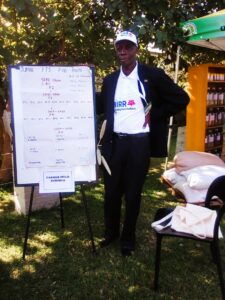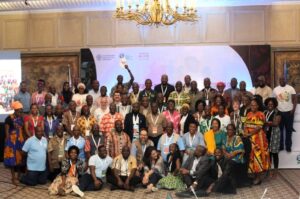August, 2023 – IIRR-Kenya recently completed its technical assistance services for the inception phase of the Dryland Sustainable Landscapes Impact Program (DSL-IP). This FAO-led program aims to avoid, reduce, and reverse further degradation, desertification, and deforestation of land and ecosystems in dryland areas through the sustainable management of natural landscapes. IIRR-Kenya provides technical assistance to six of the 11 countries where the program is implemented.
 In providing technical assistance for this program, IIRR works closely with Participatory Rural Advisory Services and Farmer Field Schools (FFS) to address the challenges faced by countries while implementing Sustainable Land/Forest Management (SLM/SFM) in pursuit of Land Degradation Neutrality (LDN).
In providing technical assistance for this program, IIRR works closely with Participatory Rural Advisory Services and Farmer Field Schools (FFS) to address the challenges faced by countries while implementing Sustainable Land/Forest Management (SLM/SFM) in pursuit of Land Degradation Neutrality (LDN).
A key barrier faced across participating countries is the low coverage of extension systems for agriculture, forest, and rangeland, which impedes the implementation of more integrated approaches that can address land degradation more effectively. Many farmers and forest users do not have access to information on central challenges regarding land degradation, have limited access to appropriate and socially acceptable SFM and SLM approaches, and have limited connections to post-production and marketing systems. The FFS approach is used to overcome these barriers by building on local knowledge, thus empowering farmers and herders to integrate farm and forest-related practices for sustainable land and forest management.
In the inception phase of DSL-IP, IIRR-Kenya led efforts to assess and document country-level FFS capacity strengths, gaps, and needs. These findings were then used to develop country-specific integrated capacity development and implementation plans as well as a joint monitoring and evaluation framework. IIRR-Kenya also contributed to the planning of and participated in the first DSL-IP Regional Stakeholders Workshop for Southern Africa, with close to 100 participants from nine dryland countries and partner organizations participating.
 The implementation phase of DSLP-IP is anticipated to begin in August 2023 and last for three years. In this phase, IIRR-Kenya will continue to provide technical assistance in the development of training content and modules, including translation into the local languages. IIRR-Kenya will also support and mentor local facilitators and master trainers to ensure training curricula are delivered and disseminated effectively. Lastly, IIRR-Kenya will implement its monitoring and evaluation system to track FFS progress in dryland sustainable management and develop communication products to document the impact of DSL-IP.
The implementation phase of DSLP-IP is anticipated to begin in August 2023 and last for three years. In this phase, IIRR-Kenya will continue to provide technical assistance in the development of training content and modules, including translation into the local languages. IIRR-Kenya will also support and mentor local facilitators and master trainers to ensure training curricula are delivered and disseminated effectively. Lastly, IIRR-Kenya will implement its monitoring and evaluation system to track FFS progress in dryland sustainable management and develop communication products to document the impact of DSL-IP.
The program – in coordination with the International Union for Conservation of Nature (IUCN), World Wildlife Fund (WWF), and the World Bank as implementing agencies – is being implemented across dryland communities in three geographical clusters: the Miombo and Mopane ecosystems of southern Africa; the savannas of West and East Africa; and the temperate grasslands, savannas, and shrublands of Central Asia.



